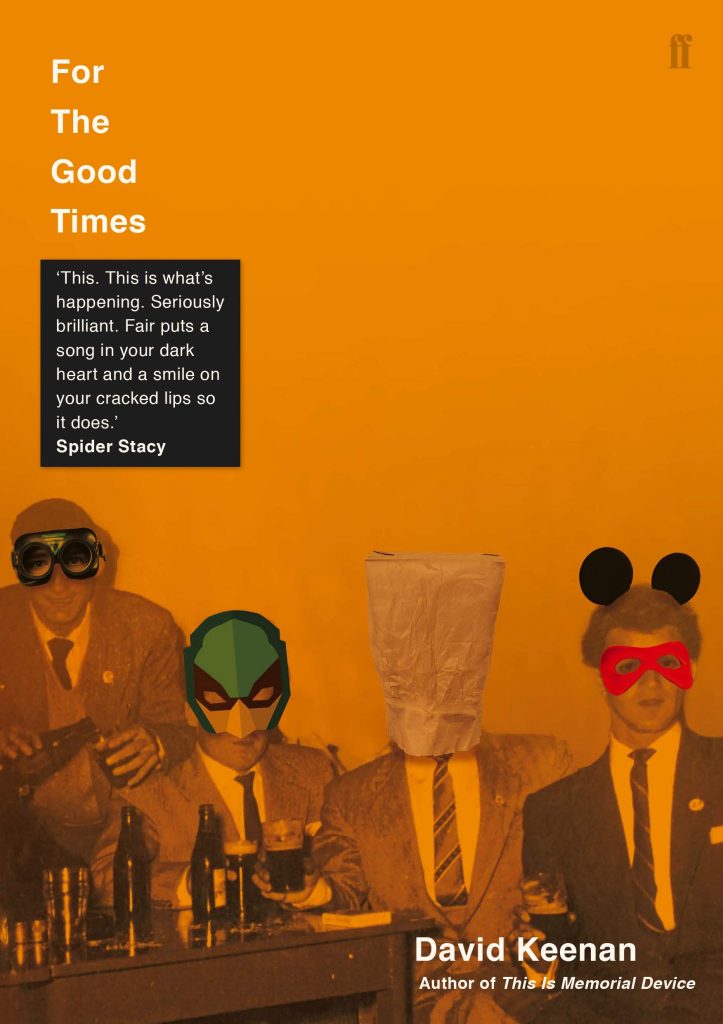Behind me, mirrored, the head of the snake, puffs, opens its black hood, my brain is going to fucking, spunk, bears fangs in its opened mouth, hoods its tongue, is spit on a mirror, and mirrored is miracle: because I know now why there are no snakes in Ireland. I know now. Saint Patrick told them to beat it because snakes move through time differently from us. Their tails are in the past but their heads are in the future. That’s why Saint Patrick told them to beat it. He had to get rid of them. Because if you can read the future then the game is up. And where would Ireland be without the game?
In Anna Burns’s Milkman, a young woman takes refuge in literature as a way of escaping the random brutality of life in the dystopia that is Belfast during the Troubles. In For the Good Times, we are on the other side of the fence, with the milkman who wasn’t really a milkman or at least others like him, pissing about and getting pissed and doing revenge jobs for the Ra while we’re about it.

This is a world where the laughter is loud and the singing is wild and the blood flows painfully and often. This is not a comfortable place to be. This discomfiting impasse, this rupture between a world in which life is lived and comic books are enjoyed and smart clothes admired and the hell in which lives are taken tit for tat and artists burn alive behind barricaded doors is conveyed to us through the words of Sammy, a provo in his youth, now in prison. Sammy is visited by visions – of his beloved best friend Tommy and the horrors they committed together, of the snake that stands for treachery and every single mistake made by every man, ever.
This extraordinary division in register, shifting the novel back and forth between Sammy’s hard-nosed, almost flippant account of irreconcilable social division and its violent consequences, and the hallucinogenic, occult imaginings of a pawn in the game who intuits realities and poetries beyond, realities that are almost more terrifying and more brutal than the blood and grime that is become his daily grind.
For the Good Times reaches beyond social realism into visionary experimentalism to offer us a novel that is in full control of its combustible material, deploying it in a manner that must rank as one of the harshest critiques of paramilitary violence you will ever read, at the same time utilizing it brilliantly as just that: material for the construction of a complex and subversive, bravura work of art.
As an unflinching portrait of these ‘good times’ this book is painful, hard-hitting, difficult to deal with. As the work of a writer who surely counts as one of the most exciting and complete artists at work in Britain today, For the Good Times is a must-read. To add that Keenan’s writing channels the spirit of Gordon Burn to an uncanny degree would seem superfluous to requirements.
“I wanted to make the point in a way that the modernist tradition in Ireland really stems from the Irish vernacular, the love of telling jokes, and the idea that storytelling is performative, and that there are different ways in which to perform a story. I wanted some passages to have the cadences of songs, I wanted to have stories told like interviews back and forth, and some that were pure fantasy like comic strips—this all comes from the Irish folk tradition, but also from the Irish street tradition, which I think definitely informs Irish modernism: that tremendous faith in the power of language.”
(From a fabulous interview with David Keenan at The London Magazine here.)